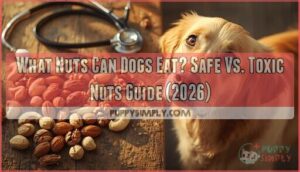This site is supported by our readers. We may earn a commission, at no cost to you, if you purchase through links.
Your dog just snatched a cashew off the counter, and now you’re frantically googling whether you need to rush to the emergency vet. It’s a scenario that plays out in households daily, and the answer isn’t always straightforward.
While some nuts offer nutritional benefits and make perfectly safe occasional treats, others can trigger serious reactions ranging from temporary weakness to life-threatening seizures. The difference between safe snacking and a veterinary emergency often comes down to the specific type of nut, how it’s prepared, and the amount your dog consumes.
Understanding which nuts belong in your dog’s diet—and which ones should never come near their food bowl—can help you make confident decisions when those begging eyes are staring up at you.
Table Of Contents
- Key Takeaways
- Which Nuts Are Safe for Dogs?
- Which Nuts Are Toxic to Dogs?
- Nutritional Benefits of Safe Nuts
- Health Risks of Feeding Dogs Nuts
- How Much Nut Can Dogs Safely Eat?
- Signs of Nut Toxicity in Dogs
- What to Do if a Dog Eats Toxic Nuts
- How to Safely Feed Nuts to Dogs
- Healthy Alternatives to Nuts for Dogs
- Frequently Asked Questions (FAQs)
- Conclusion
Key Takeaways
- Plain, unsalted peanuts and cashews are the safest nut options for dogs, but even these should be given in small amounts — no more than a few pieces at a time.
- Macadamia nuts, black walnuts, and moldy nuts are genuinely dangerous and can cause vomiting, tremors, or seizures within hours, so keep them completely out of reach.
- Even “safe nuts” carry real risks like choking, pancreatitis, and weight gain, so always remove shells, skip salted or seasoned varieties, and treat nuts as an occasional snack rather than a regular part of your dog’s diet.
- If your dog eats a toxic nut, skip the home remedies and call the ASPCA Poison Helpline (1-888-426-4435) or your vet right away — early action makes a significant difference.
Which Nuts Are Safe for Dogs?
Most nuts aren’t ideal for dogs, but a few can work as occasional treats when prepared correctly.
Before offering any nut, check which varieties are safe for dogs since some common types can cause serious health issues.
The key is keeping small portions and avoiding anything salted, seasoned, or covered in coatings. Here are the nuts that get the green light from a safety standpoint.
Peanuts (Unsalted, Plain)
Plain peanuts rank among the safest nuts for dogs when you offer them unsalted and shell-free. They deliver protein, healthy fats, and B vitamins that support canine health and coat shine.
Still, peanut allergies exist in some dogs, so watch for itching or swelling after the first taste. Stick to a few kernels at a time—peanuts pack about 587 calories per 100 grams, making portion control essential for dog nutrition.
It’s important for dog owners to understand the risks associated with peanuts before adding them to their pet’s diet.
Cashews (Plain, Limited Amounts)
Cashews sit in the safe-nuts-for-dogs category, but only when they’re plain and unsalted. Your dog can enjoy a few cashew kernels as an occasional treat without the toxicity risk of macadamia nuts.
Still, cashew nutrition comes with high fat content—about 4 grams per 10 nuts—so limit small dogs to one or two and larger breeds to five. Watch for signs of nut allergies or canine digestion upset, and practice careful nut storage to prevent mold exposure that threatens pet safety.
It’s important to be aware that cashews can cause gastrointestinal upset in dogs, especially if consumed in large amounts.
Chestnuts (Cooked, Unsalted)
Unlike cashews, cooked chestnuts offer a starchy, low-fat option for safe nuts for dogs when prepared properly.
Chestnut preparation matters—always boil or steam them plain, peel completely, and chop into bite-sized pieces to support canine digestion and prevent choking.
Chestnut nutrition provides potassium and vitamin C with nutrient benefits, but watch for dog chestnut allergy signs and limit portions to avoid upsetting your pup’s stomach.
Pistachios (Unshelled, Unsalted)
Pistachios sit in a gray zone regarding safe nuts for dogs. They’re not toxic, but their high fat content can challenge canine digestion, especially in small breeds.
For dog nutrition and health, stick to one or two plain, shelled pistachios occasionally. Always follow feeding guidelines, skip salted varieties, and check your nut storage—moldy pistachios produce aflatoxins that are genuinely dangerous.
Hazelnuts (Small Quantities)
Hazelnuts fall into that “technically okay” category for dog nutrition and health. One or two plain, shelled hazelnuts won’t harm most medium or large dogs, but their high fat content can challenge canine digestion and trigger pancreatitis in sensitive pets.
Skip nut butters with xylitol, watch for dog allergies, and always follow proper nut storage tips to avoid moldy, mycotoxin-contaminated nuts.
Which Nuts Are Toxic to Dogs?
Not every nut that seems harmless is actually safe for your dog. Some can cause serious health problems, and a few are genuinely dangerous even in small amounts.
Here are the nuts you need to keep away from your pup.
Macadamia Nuts
Macadamia nuts are one of the most dangerous toxic foods for dogs — even a small handful can cause serious harm. Signs of toxicity usually appear within 3 to 12 hours and include vomiting, weakness, tremors, and fever.
Macadamia nuts are extremely toxic to dogs—just a small amount can cause vomiting, weakness, tremors, and fever within hours
Given their rich macadamia nutrition profile and high fat content, they offer zero safe benefits for dog nutrition and health. Keep them far from your pet.
Walnuts and Black Walnuts
Walnuts sit at very different toxicity levels depending on type. Black walnut poisoning is genuinely dangerous — the juglone compound can trigger tremors and convulsions fast.
Watch for these signs of nut poisoning:
- Vomiting and rapid breathing
- Uncontrolled tremors or seizures
- Sudden weakness or collapse
Moldy nuts make things worse by adding mycotoxins. For your dog’s health and nutrition, avoid all walnuts entirely.
Pecans and Hickory Nuts
Pecans and hickory nuts both contain juglone, a toxic compound that irritates your dog’s digestive tract and can trigger vomiting, diarrhea, and even pancreatitis.
Canine nut poisoning becomes especially dangerous when moldy nut dangers enter the picture — tremorgenic mycotoxins from old or damp nuts can cause seizures. Given these hickory nut risks, keep both completely off your dog’s menu.
Almonds and Other Unsafe Nuts
Almonds might seem harmless, but they’re actually one of the sneakier threats to canine health. Dogs can’t digest them well, and the high fat content raises real toxic effects on the pancreas, triggering painful pancreatitis.
Beyond dog nutrition concerns, almond allergy reactions and nut poisoning signs like vomiting and blockages make almonds — and any mixed toxic nuts to avoid — a clear no for your dog’s bowl.
Moldy or Old Nuts
That “still good enough” nut sitting in your pantry could quietly threaten your dog’s health. Mold detection matters because moldy nuts — even ones that look fine — can harbor aflatoxins, dangerous mycotoxins that damage a dog’s liver.
Proper nut storage and spoilage prevention aren’t just housekeeping habits; they’re real dog health protectors. When in doubt, throw it out.
Nutritional Benefits of Safe Nuts
Safe nuts aren’t just a fun snack — they actually bring a few real nutritional perks to the table for your dog. Of course, the benefits only apply when you’re choosing the right ones in the right amounts.
Here’s a closer look at what your dog can gain from the safe nuts that made the safe list.
Protein and Amino Acids
Peanuts punch above their weight in terms of canine nutrition needs — offering roughly 25 grams of protein per 100 grams. For dog nutrition and diet, that’s a meaningful number.
But here’s the reality: safe nuts are nutrient supplements, not primary protein sources. Your dog’s amino acid balance depends on quality meat-based food, not occasional nut snacks.
Healthy Fats and Fiber
Beyond protein, nuts like peanuts, cashews, and pistachios offer unsaturated fats that support your dog’s coat and heart health.
Pistachios pack around 10 grams of fiber per 100 grams, making them surprisingly fibrous. These fat sources and fiber benefits can aid digestive health, but caloric intake adds up fast — roughly 25–30 calories per small serving — so nutrient balance matters.
Essential Vitamins and Minerals
Those healthy fats carry something extra — safe nuts quietly deliver micronutrients that support your dog’s daily function.
- B Vitamin Benefits: Peanuts provide niacin; cashews offer thiamin for nerve support
- Vitamin E Role: Protects cells and promotes a shiny coat
- Mineral Contributions: Cashews supply magnesium; pistachios offer potassium for fluid balance
- Nutrient Balance: Nuts complement — never replace — complete dog food
- Canine Dietary Needs: Small amounts support Nutrition and Wellness without disrupting Dog Nutrition
Health Risks of Feeding Dogs Nuts
Even safe nuts come with some real risks you need to know before sharing them with your dog. Size, fat content, and added ingredients can all cause problems that range from mild stomach upset to something more serious.
Here are the main health risks to keep in mind.
Choking Hazards and Obstructions
Nuts are one of the sneakiest choking hazards hiding in plain sight. Because a dog’s windpipe and esophagus share the same throat space, a single whole nut can cause serious airway obstructions before you even react.
| Risk Factor | Why It Matters | Dog Safety Tip |
|---|---|---|
| Canine Anatomy | Narrow airways increase choking risks | Crush nuts before offering |
| Nut Fragmentation | Sharp shell pieces lodge in airways | Remove all shells first |
| Emergency Response | Silent choking needs immediate action | Learn pet first-aid basics |
Gastrointestinal Upset and Pancreatitis
Pancreatitis is one of the scariest consequences of poor dog diet choices involving high-fat foods. When fatty acids overwhelm your dog’s pancreas, canine inflammation kicks in fast — causing gastrointestinal upset like vomiting, diarrhea, and belly pain within hours.
Even seemingly harmless nut butters can trigger this if xylitol-free labels mask fat levels. Toxic nuts like macadamias worsen dog gut health dramatically. If your dog seems hunched or nauseous, don’t wait — call your vet.
Obesity and Weight Gain
It’s easy to underestimate how quickly nut calories add up in your dog’s diet. Most nuts pack 160–200 calories per ounce — a serious calorie intake hit for a dog with a small daily allowance. Without careful portion control, obesity sneaks up fast.
- Frequent nut treats disrupt nutritional balance
- Small dogs face higher obesity risk per piece
- Healthy snacking means counting every treat calorie
Salt, Seasonings, and Additives
Beyond the nut itself, what’s on it can be just as dangerous. Salted snacks carry 80–120mg of sodium per handful — enough to push your dog toward toxicity.
Flavor enhancers like garlic and onion powders cause hemolytic anemia. Toxic coatings with chocolate threaten their heart. Artificial sweeteners, especially xylitol in nut butters, trigger seizures and liver failure. Oil roasting adds hidden fat. Always read every label.
How Much Nut Can Dogs Safely Eat?
Knowing which nuts are safe is only half the battle — how much you give matters just as much. Even the safest nut can cause problems if your dog gets too much of it.
Here’s what you need to know about serving sizes, how often to offer them, and how they fit into your dog’s daily calories.
Recommended Serving Sizes
Size really does matter in terms of daily nut limits and safe feeding. A small dog under 20 pounds should get no more than one or two cashews per snack session. Medium dogs can handle two to five pieces.
For nut portion control and calorie restrictions, follow dog size guidelines — even healthy snacks add up fast in dog nutrition.
Frequency and Portion Control
Think of nut treats like a weekly allowance — once it’s gone, it’s gone. For solid portion control and canine health, keep these feeding frequency guidelines in mind:
- Offer safe nuts no more than two to three times per week
- Cap daily treat limits at 10% of total caloric intake
- Pre-portion snacks to prevent accidental overfeeding
Snack scheduling protects your dog’s long-term nutrition for dogs.
Caloric Impact on Daily Diet
Nuts pack a surprising caloric punch. A 10-pound dog only needs about 218 calories daily, so daily calorie limits leave room for just 22 treat calories — that’s fewer than 5 grams of peanuts.
For smart diet planning, count nuts like any caloric intake decision. Nutrition advice for dogs always prioritizes nutrient balance first, keeping energy needs met without tipping your dog’s dietary restrictions into unhealthy territory.
Signs of Nut Toxicity in Dogs
If your dog got into some nuts, knowing what to watch for can make a real difference.
Some symptoms show up fast, while others take a little time to appear.
Here are the key signs of nut toxicity to keep on your radar.
Vomiting and Diarrhea
Vomiting and diarrhea symptoms are often the first nut poisoning symptoms your dog will show, usually appearing within 3 to 12 hours after eating toxic foods for dogs like macadamia nuts or high-fat pecans.
Canine gastroenteritis from nuts can last 24 to 48 hours. Dehydration risks rise fast, so if vomiting exceeds three episodes, emergency vet care is essential.
Weakness and Lethargy
Beyond stomach trouble, nut poisoning can hit your dog’s energy hard. Macadamia nuts are a prime example — canine fatigue and weakness symptoms can appear within 3 to 12 hours, leaving your dog wobbly, slow, or reluctant to stand.
Watch for these lethargy causes and toxic reactions:
- Unusual stillness or sleeping more than normal
- Struggling to walk or climb stairs
- Slow responses to familiar sounds or commands
Seizures and Neurological Symptoms
Some toxic foods for dogs go beyond weakness and actually disrupt the brain. Macadamia nuts and moldy walnuts both carry neurotoxin effects that can trigger seizures within hours.
Mycotoxins found in old nuts are serious seizure triggers, sometimes causing tremors, disorientation, and nut poisoning that demands emergency response fast. If your dog is shaking or seizing, that’s a veterinary emergency — don’t wait.
Swelling and Allergic Reactions
Some dogs experience skin reactions and facial swelling quickly after eating certain nuts. Hives, puffy eyes, and a swollen muzzle are early canine allergies warning signs.
These allergic reactions can escalate into anaphylaxis signs like vomiting, pale gums, and collapse. If you notice any of these food allergies symptoms, especially trouble breathing, treat it as an emergency care situation immediately.
What to Do if a Dog Eats Toxic Nuts
Finding out your dog ate macadamia nuts or black walnuts can send your heart racing — but how you respond in those first few minutes really matters. The good news is there are clear steps you can take right away to protect your dog. Here’s what to do.
Immediate Actions to Take
Staying calm is your first real tool here. Check the package right away to assess nut type and confirm whether toxic foods like xylitol or chocolate are involved. Gather your dog’s weight, age, and health history.
Call poison helplines — ASPCA at 1-888-426-4435 or Pet Poison Helpline at 1-855-764-7661 — for immediate veterinary advice. Avoid home remedies entirely; they can worsen your dog’s health risks.
When to Contact a Veterinarian
Always call your vet immediately for toxic exposure to macadamia nuts, moldy walnuts, or chocolate-covered mixed nuts — urgent care can’t wait. Seek emergency signs like tremors, repeated vomiting, or seizures as your green light for an emergency clinic.
For dog health risks from unknown nut mixes, veterinary advice the same day protects your pet. When in doubt, early vet consultation is always the right call.
Monitoring Symptoms at Home
Vigilance is your best tool in the hours after a toxic nut exposure. Even while waiting for vet guidance, careful observation at home matters.
- Vomit Tracking & Symptom Logging: Note frequency, color, and timing every few hours.
- Temperature Checks & Hydration Monitoring: Normal temp is 100–102.5°F; check gums for stickiness.
- Mobility Assessment: Watch for hind leg weakness or wobbly gait — key dog health risks signaling worsening canine reactions.
How to Safely Feed Nuts to Dogs
Feeding nuts to your dog isn’t just about picking the right kind — how you serve them matters just as much.
A few simple steps can make the difference between a safe snack and a trip to the vet.
Here’s what to keep in mind before you hand one over.
Removing Shells and Choking Risks
A nut shell isn’t just tough — it can scratch your dog’s throat or block their intestines entirely. That’s why shell removal tips matter before you offer even a single cashew or peanut.
| Preparation Step | Why It Matters |
|---|---|
| Remove all shells | Prevents internal scratching and blockage |
| Crush or halve kernels | Reduces airway obstruction risks |
| Supervise every feeding | Allows for fast response to choking |
Supervised feeding methods and keeping nut kernel safety in mind lower choking hazard prevention risks substantially.
Choosing Unsalted, Unseasoned Nuts
Salt is basically the first thing to check in terms of nut selection for your dog. Plain, unsalted nuts protect pet safety by avoiding sodium overload that strains the heart and kidneys.
Smart dog nutrition starts with reading labels carefully. Look for:
- No added salt or sodium
- No garlic or onion powder
- No spices or seasoning blends
- No sugary glazes or honey coatings
- Single-ingredient only for safe dog treats. Canine nutrition depends on keeping toxic foods off the snack list entirely.
Avoiding Flavored and Moldy Nuts
Flavored nuts hide serious toxic foods and substances that threaten pet safety. Garlic powder, onion seasoning, and xylitol dangers lurk in sweet or spicy coatings, making these a hard no for dogs.
Mold detection matters just as much—spoiled nuts produce tremor-causing toxins even when fuzzy growth isn’t visible. Proper nut storage, freshness checks, and avoiding flavor risks keep your pup safe from nut allergy symptoms and worse.
Healthy Alternatives to Nuts for Dogs
If nuts don’t fit your dog’s diet, plenty of healthier options can satisfy their snack cravings without the risks.
Fruits, vegetables, and vet-approved treats deliver nutrition and variety while keeping portion sizes easy to manage.
Here are some dog-friendly alternatives that won’t stress you out at treat time.
Safe Fruits and Vegetables
Your dog will love these wholesome alternatives that beat nuts for both safety and nutrition. Fresh fruit options and vegetable safety matter for canine diet planning, so try these healthy dog treats:
- Blueberries – Low-sugar snacks packed with antioxidants
- Carrot sticks – Crunchy, low-calorie training rewards
- Watermelon chunks – Hydrating summer treats (seeds removed)
- Green beans – Fiber-rich fillers for weight control
- Apple slices – Vitamin-packed bites (no seeds or core)
Nut-Free Dog Treats
Beyond fresh produce, store-bought and homemade biscuits work well for nut-allergic dogs. Seed butter alternatives like sunflower spread give you the same creamy texture without peanut exposure, while coconut milk benefits include rich flavor and hypoallergenic fat. Many nut-free recipes use whole wheat or oat flour as a safe base.
| Ingredient Type | Common Examples | Key Benefit |
|---|---|---|
| Flour Base | Whole wheat, oat, rice | Structure without allergens |
| Binding Agent | Pumpkin puree, banana | Moisture and fiber |
| Fat Source | Sunflower butter, coconut milk | Creamy texture, no nuts |
| Protein Boost | Egg, plain yogurt | Promotes muscle health |
| Flavor Add-In | Sweet potato, blueberries | Natural sweetness, vitamins |
When choosing healthy dog treats, check labels for clear “nut-free” statements to guarantee pet nutrition safety.
Dog-Friendly Seeds and Grains
Seeds and whole grains bring seed nutrition and grain benefits without nut risks. Ground flaxseed aids canine digestion at roughly one teaspoon per ten pounds of body weight, while cooked brown rice and oats offer gentle fiber. These pet food options count as healthy treats, so measure portions carefully—dog wellness and nutrition depend on balance, and safe and toxic nuts teach us portion control matters for all nutrition for dogs add-ins.
- Flax and chia: Rich in omega-3s for skin and coat health
- Pumpkin kernels: Unsalted, shelled seeds as crunchy toppers
- Cooked quinoa: Complete protein, gluten-free grain option
Frequently Asked Questions (FAQs)
What nuts are safe for dogs to eat?
Plain peanuts and cashews are generally safe in tiny amounts when unsalted. Cooked chestnuts work too.
However, canine nutrition experts stress moderation—these treats should never replace balanced meals for ideal dog wellness and nutrition.
Can dogs eat nuts?
Pet safety experts get this question constantly: yes, dogs can technically eat certain nuts, but canine nutrition science reveals most aren’t worth the risk given choking dangers and toxic foods lurking in common varieties.
Can dogs eat walnuts?
No, dogs shouldn’t eat walnuts. These nuts pose serious pet safety risks, including walnut toxicity from black walnuts, choking hazards, digestive upset, and potential mold exposure that threatens canine health and overall pet health.
Can dogs eat macadamia nuts?
No — macadamia nuts are poisonous to dogs and should never be fed to them. Even small amounts can cause muscle weakness, vomiting, tremors, and fever within hours of ingestion.
Can dogs eat hazelnuts?
Think of hazelnuts as a yellow light—not toxic, but proceed with caution. While not poisonous, these nuts pose choking risks, potential blockages, and pancreatitis concerns, especially for smaller dogs.
Safer dog treats exist.
Can dogs eat chestnuts?
Yes, dogs can eat sweet chestnuts — but only sweet or American chestnuts, cooked plain and unsalted.
Skip horse chestnuts entirely; they’re toxic.
Chestnut preparation matters: remove all shells and cut pieces small for safe canine digestion.
Can dogs eat pine nuts?
Pine nuts are safe for dogs in tiny amounts. These seeds — not true nuts — are calorie-dense and high in fat, so too many risk pancreatitis.
Stick to just a few plain, unsalted pieces occasionally.
How many nuts should a dog eat a day?
Honestly, less than you’d think. Daily nut limits are tight — treats shouldn’t exceed 10% of your dog’s daily calories. Dog size matters: a small pup gets one or two pieces max.
Can dogs eat cashews or almonds?
Dogs can eat plain, unsalted cashews occasionally, but almonds are best avoided entirely. Cashews are non-toxic in small amounts, while almonds pose real digestion and choking risks for most dogs.
What is the most toxic thing for dogs to eat?
Beyond macadamia toxicity, the most dangerous things for dogs include xylitol, grapes, chocolate, and caffeine.
Even tiny amounts can trigger seizures, kidney failure, or death — making food safety absolutely critical for your dog’s health.
Conclusion
Knowing what nuts can dogs eat isn’t just trivia—it’s the kind of knowledge that could save your dog’s life one ordinary afternoon.
A single macadamia nut or moldy walnut can turn a casual snack into a veterinary emergency. Stick to plain, unsalted peanuts or cashews in small amounts, and always check before sharing.
Your dog trusts you completely with every bite. That trust deserves a thoughtful, informed response every time.
- https://www.preventivevet.com/pets/safe-and-unsafe-nuts-and-seeds-for-pets
- https://www.purina.com/articles/dog/feeding/can-dogs-eat/nuts
- https://www.shilohsvet.com/blog/in-the-know-about-nuts-can-my-dog-eat-nuts/
- https://drjudymorgan.com/blogs/blog/nuts-for-pets
- https://www.vets-now.com/pet-care-advice/can-dogs-eat-nuts/




















